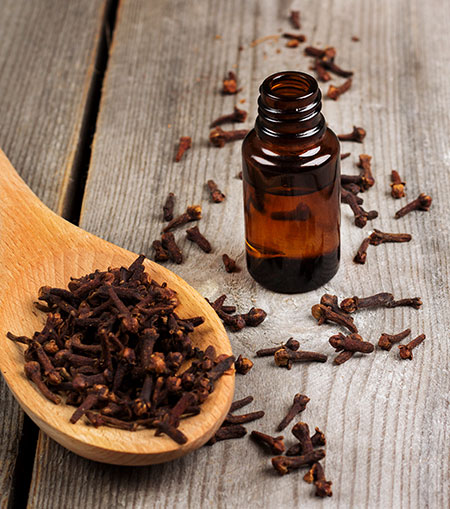
Though a refined form is used in dental materials, clove oil can be toxic if digested and used incorrectly.
Various sites and organizations regularly release claims about foods or products that can prevent cancer.
You may have heard this claim about clove oil.
Marshfield Clinic pharmacists and dentists raise a caution flag about clove oil’s limited healthful uses.
Clove oil as cancer prevention
In truth, clove oil hasn’t been studied in many health areas, said Josh Lee PharmD., Marshfield Clinic pharmacy resident.
Clove oil has been tested on cancer cells in laboratories,” he said, “but it actually hasn’t been studied in humans. To my knowledge, there have been no credible studies in humans proving it prevents cancer or treats cancer.”
Legitimate uses
Eugenol is an ingredient of clove oil used in dentistry.
“Dentists use a refined form of clove oil for dental materials, which include dry socket paste, periodontal surgical pastes and root canal materials,” said Dr. Srinivas Challa, a Marshfield Clinic dentist.
Additionally, it is used in gum dressing and dry socket materials, added Dr. Divya Bhalla, also a dentist.
“Eugenol is antiseptic, antibacterial and antifungal,” Bhalla said. “Basically, it helps alleviate pain while also preventing infections.”
A home remedy
Mostly, Lee, Challa and Bhalla agree clove oil should not be used at home without proper research and discussion with a doctor, pharmacist or dentist.
Some over-the-counter emergency toothache kits contain natural eugenol, which can be used as a temporary remedy to replace a lost filling until seeing a dentist, said Challa.
“Clove oil can sting, burn or cause an allergic reaction, and some people are more sensitive than others,” Bhalla said. “It is always safest to see your dentist immediately than to self-medicate.”
Words of caution
People with bleeding disorders should not use clove oil because there is a risk of increased bleeding.
For the same reason, always inform your doctor if you are taking clove oil supplements because it can mix poorly with medications or increase bleeding during surgery, said Lee.
Diabetics also should use caution. Clove oil can cause sudden increases in blood sugar levels.
If digested by anyone (especially children) in excess amount, it can be toxic, and is linked to lactic acidosis and liver failure, said Lee.
“I tell patients to be smart consumers,” he said. “With any herbal supplement or extract, do your homework and check that claims are legitimate. Talk to your doctor or pharmacist before adding herbal supplements to your health routine.”

